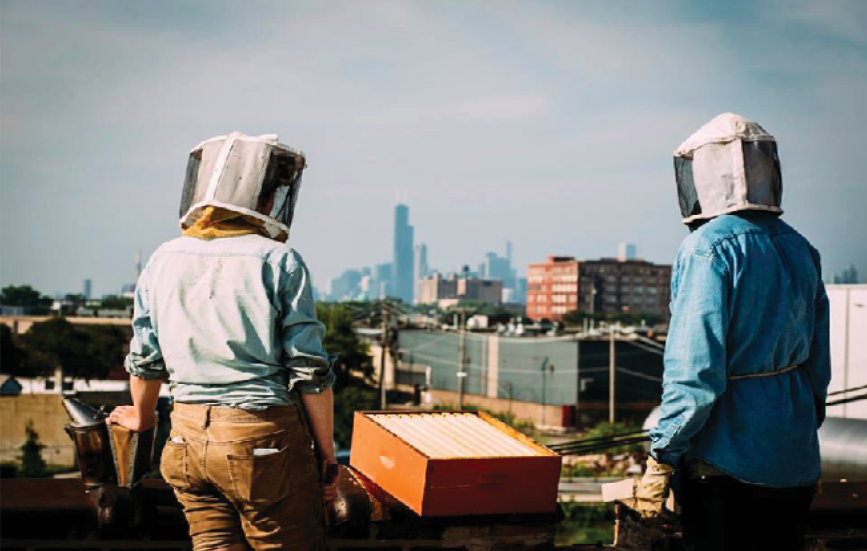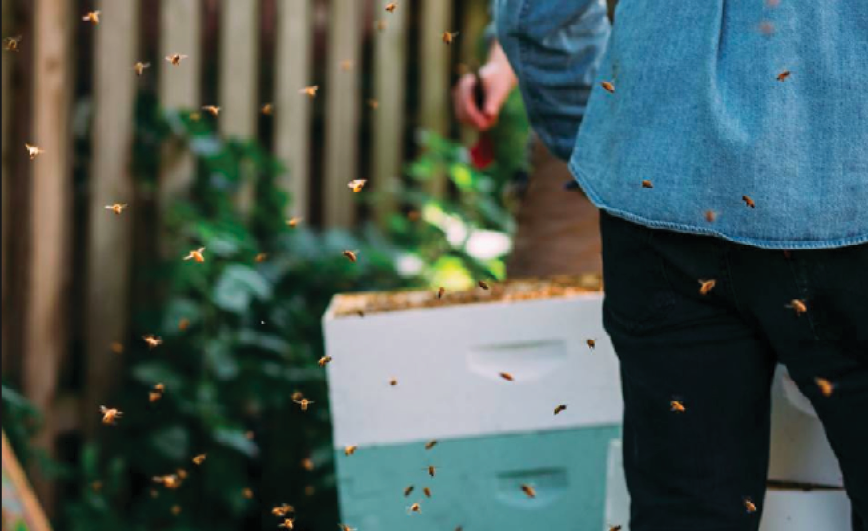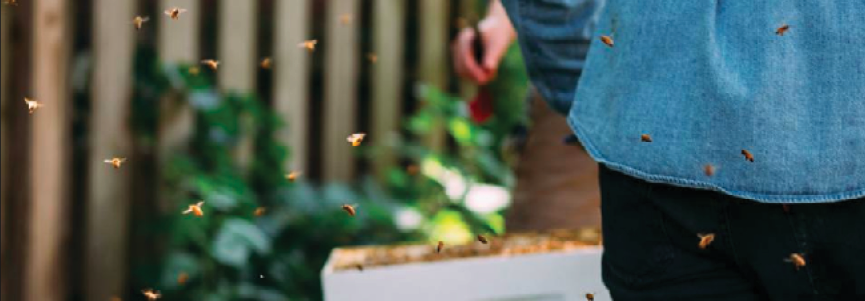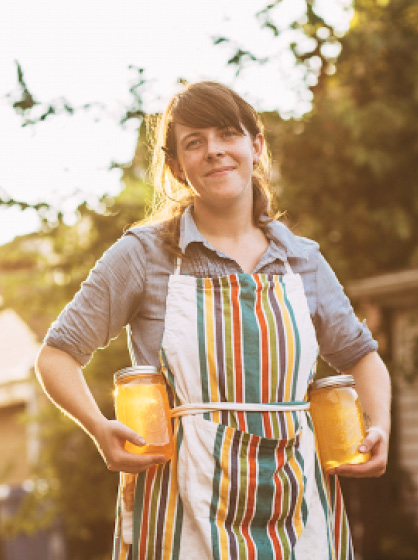Every morning, Jana Kinsman pulls her bike into Chicago traffic on her way to work. Unlike the other commuters, who are heading to downtown skyscrapers for their 9-5 desk jobs, Kinsman rides her bike to meet her thousands of workers. When she arrives at her South Side destination, she is greeted by a cacophony of buzzing employees. Kinsman’s office? A community garden. Her desk? A beehive. Kinsman is an urban beekeeper and founder of Bike a Bee, an urban beekeeping initiative that in recent years has worked in community gardens to make honey and teach local communities about bees.
Kinsman grew up in the Chicago suburbs and worked for a few years as a graphic designer and illustrator. However, she had been fascinated by insects as a child, and after college found herself interested in agriculture and self-sufficient farming. It wasn’t until the winter of 2011 that her interest in beekeeping solidified. While taking a beekeeping class with the Chicago Honey Co-op, she found herself “riveted” by the lectures, on which she was “writing pages and pages of notes” about how to keep bees.

Photo courtesy of Adam Alexander
Although she knew bees fascinated her and that she wanted to try her hand at keeping them, she didn’t know where or how she would go about doing it. As a result, that summer Kinsman went to Eugene, Oregon for five weeks to work as an apprentice to a local beekeeper. During this time, she learned how he cared for his bees, which he kept in his backyard, as well as in community areas around Eugene, such as an elementary school, a blueberry farm, and in community gardens. Although most beekeepers contain their hives to a single area out of convenience, her mentor would drive around the community to check on the hives. This allowed him to keep more hives and to share bees with his larger community.
Bike a Bee began as a joke; inspired by visiting her mentor’s hives, Kinsman joked that she would add another challenge to her beekeeping by biking to her hives. With the hands on experience of her summer in Oregon, Kinsman felt confident that she could start keeping her own bees. Back in Chicago, Kinsman began “bugging” the Chicago Honey Co-op to figure out how much her idea would cost. This led to a Kickstarter campaign in 2012 and by that spring Bike a Bee had begun.
Bike a Bee’s hives are hosted in community gardens around Chicago, and Kinsman travels by bike to inspect and tend to them. For Kinsman, there is no typical day at work. During the winter, when the hives are dormant, she takes advantage of this time to travel, to save up money for the summer, and to prepare for the next year. During the spring and summer months, Kinsman inspects her hives every seven to ten days. Although many of her tasks are physical, from biking to the various gardens, to smoking the hives, beekeeping is also a thought intensive pursuit. Kinsman enjoys the amount of critical thinking involved in beekeeping, and much of her daily task involves observing the environment to see the size and development of the colony, the weather, and how the bees’ food sources, local trees and flowers, are growing.

Photo courtesy of Adam Alexander
In making the transition from Oregon to Chicago, the biggest change was the weather. As a result, Kinsman and her friends at the Chicago Honey Co-op “encourage local genetics by raising colonies whose Queens are used to the climate through selective breeding of the Queens and of the drones.” This helps create colonies that will thrive in northern climates. Furthermore, because Kinsman’s hives are located across many community gardens, the local environment greatly impacts the bees and the honey. While keeping bees in many locations isn’t necessarily the most efficient practice, it “makes for a more interesting project,” as well as for more interesting flavors in the honey. As honey’s profile changes based on the bees’ diets, each garden’s honey will be greatly impacted by what is blooming in the vicinity at that time of year, especially considering that bees will travel up to five miles around a hive. Two summers ago, for example, an abundance of white sweet clover led to the hives producing honey with a different profile from the year previous. Yet, each of the gardens also produced honey with a unique flavor based on the local environment and the particular flowers the bees chose to forage on. While Chicago is an urban environment, it is surprisingly green, especially in the South and West Sides where Kinsman keeps her hives. As a result, the bees have a variety of flower sources from which they can feed.
Despite its urban location, Kinsman largely experiences problems that are universal to beekeepers. Occasionally a beehive will die in the middle of the summer, which means that the community garden will have to wait until the following year to receive a new hive. Last summer, a less common misfortune occurred when two hives were stolen in the middle of the night. While unfortunate, Kinsman says beehive theft is even more prevalent in rural areas, where fellow beekeepers occasionally steal and sell lucrative hives. One problem Kinsman has not dealt with is Colony Collapse Disorder, which is largely associated with practices used in monoculture farming where bees are transported around the country to feed off a single flower source. In contrast, Kinsman’s bees have been largely healthy as a result of the stationary hives and diverse flower sources available to them.

Photo courtesy of Adam Alexander
Currently, Kinsman’s biggest challenge is finding the money to keep doing what she loves. Bike a Bee sells its honey at the end of the summer, which means from April to July Kinsman has to make her winter earnings stretch. While “the project makes enough money to keep [itself] going,” it still is not lucrative enough to allow Kinsman to pursue the project as a full-time job. As of now, Kinsman describes Bike a Bee as her “full-time hobby,” although she “want[s] to be doing this all the time.”
Kinsman not only produces honey, but she also educates people about bees. For people interested in getting involved in beekeeping, Kinsman recommends taking classes and finding a mentor. Because of the unique nature of beekeeping, it is imperative to “work with someone who knows what they are doing,” as a mentor can answer many questions based on their experience and they can help newcomers feel comfortable with working with bees. The other piece of advice Kinsman provides to newcomers: “Don’t be afraid of the bees.” While many gardeners from Bike a Bee’s community gardens start out afraid of the insects, by the end of the summer they have grown accustomed, even fond, of them. Kinsman notes, “The more people are around bees the more they can see the interconnectedness of nature and food.” For Kinsman, this interconnectedness is her most cherished takeaway from her work with bees, as “with beekeeping I got to be a part of something that is part of the bigger picture.”


